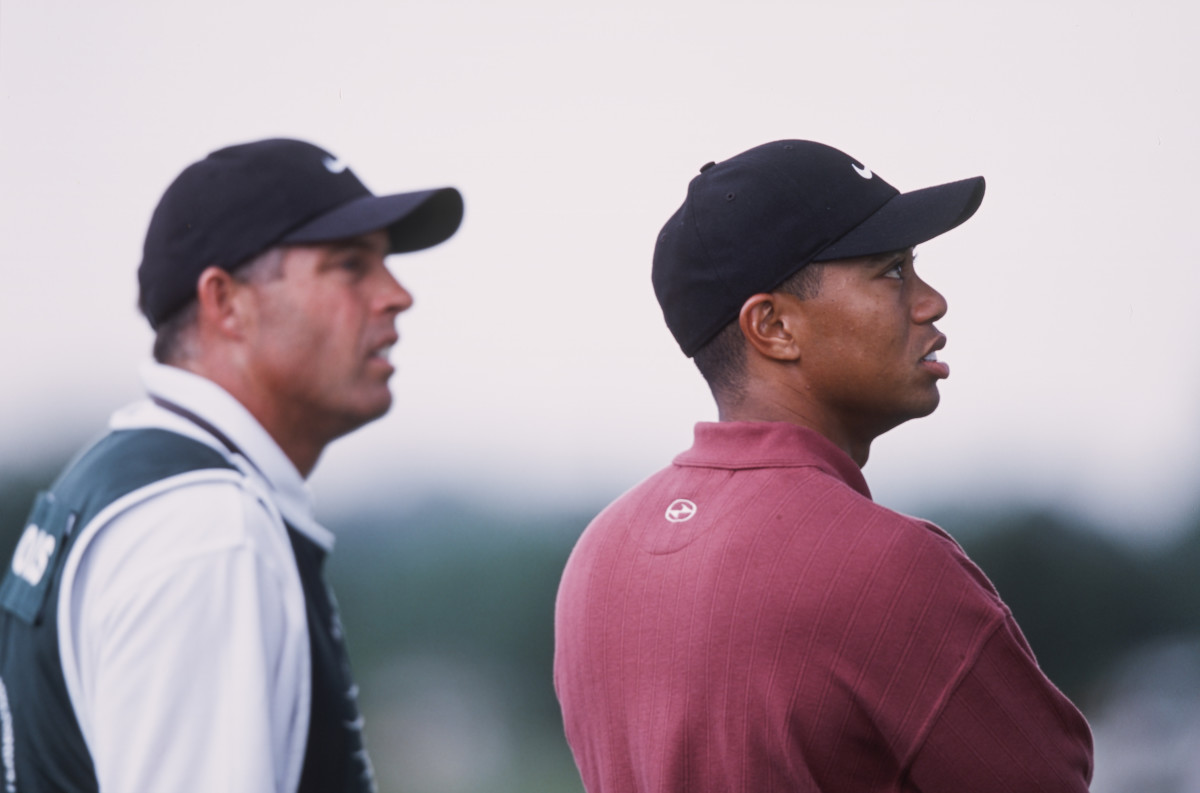
Fast facts:
- Caddies don't just carry pro golfers' clubs — they read the course, serve as advisors, and essentially coach their players through each hole.
- In the PGA, caddies typically make a weekly salary of between $1,500 and $4,000 per week.
- If their player makes the cut, places, or wins a tournament, a caddie usually receives a bonus in the form of a percentage of the winnings.
- Some of the best PGA players' caddies have made millions in the span of a few short years.
Golf is a game of superlatives. It’s the only professional sport where the player with the lowest score wins. It’s the only sport ever to be played on the surface of the moon. And it’s the only sport that authorizes the use of caddies, or golf assistants, who take care of a player’s clubs and provide them with on-field advice.
What does a PGA caddie do?
A PGA caddie wears many hats. Also known as a “looper,” their main job is to carry their player’s equipment and offer guidance on which golf club to use at each hole.
Caddies possess a deep knowledge of the rules of golf and are also expected to help keep score. They must know the “lay of the land” by understanding the distances between the greens and keeping a close eye on where their player’s ball lands.
After their golfer takes a stroke, a caddie tidies up the greens by raking the sand traps and replacing divots. At the hole, the caddie “tends to the pin” by removing the flag before their player putts in the golf ball.
Half sideline coach and half psychologist, caddies are on-hand to high-five their players when they make their putt — and to provide encouragement when they do not.

Christian Petersen/Getty Images
The best part of a caddie’s job is their ability to influence the game — sometimes a word or two is all it takes to guide their player into winning the ultimate prize. Up-and-coming PGA players, in particular, benefit from the wisdom and expertise of veteran caddies.
Cameron Young, the 2021 PGA Rookie of the Year, had grown frustrated by his performance in 2023, and so he enlisted the help of veteran looper Paul Tesori, who had previously worked with Vijay Singh and Webb Simpson. Soon after, Young hit an incredible series of nine straight par-3s on the front nine of the 2023 World Golf Championships-Dell Technologies Match Play and reached the finals, his best performance to date.
Young gave props to Tesori, telling the Augusta Chronicle, “his golf course analysis is unbelievable.”
Related: PGA vs. LIV: How pro golf’s civil war started & where it’s headed
But being a Tour caddie is not an easy gig — after all, they are beholden to another person’s talent to earn a living. And just like PGA players, caddies must spend months on the road, away from family and friends, often working outside in the rain and other poor weather conditions.
Caddies themselves have been known for adding their share of drama to the game. In 2024, caddie defections to LIV made headlines, prompted by former PGA firestarter Phil Mickelson, which served to only heighten tensions between the PGA Tour and Saudi-funded LIV league.
Players and caddies are prone to heated disagreements, even on the fairway; during the 2015 Canadian Open, for instance, Robert Allenby fired his caddie, Mick Middelmo, mid-round, and enlisted a fan to carry his clubs the rest of the game.
And heaven help those players who don’t pay up. After winning the Mayakoba Golf Classic in 2018, Matt Kuchar failed to reward his caddie, David Giral Ortiz, with the requisite 10% of his $1.296 million payout, handing him a paltry $5,000 instead.
Incensed, Ortiz shared his story with the media, and for months afterward, Kuchar was met on the greens by boos. The incident became known as “Caddie-Gate.”
Eventually, Kuchar paid Ortiz $50,000, and although that amounted to less than the 10% Ortiz deserved, it was still better than what he had received. Kuchar later admitted that “it was a moment I’m not proud of.”
How much do caddies typically make?
A contract between a caddie and their player is never publicly disclosed, but according to the Caddie Network, PGA caddies receive a base salary that they use to offset their meals, hotel stays, and travel expenses.
The base salary for new Tour caddies begins at around $1,500 a week, while veterans can earn as much as $4,000 a week: The average is roughly $2,000 per week.
This does not include bonuses based on player performance:
- When their player makes “the cut,” a caddie will receive a standard bonus of 5%.
- If their player finishes in the top 10, the caddie gets 7%.
- If their player wins, the caddie receives 10%.

Simon Bruty/Anychance/Getty Images
Who are the highest-paid caddies?
The best caddies make bank. Steve Williams caddied for Tiger Woods for more than a decade through some of his greatest wins, like the 2005 Masters, when Woods sank what is considered by many to be the greatest putt in golf history.
Williams is estimated to have made $12 million from their years-long partnership; Woods’ current caddy, Rob McNamara, reportedly has a net worth of $9 million.
More employment:
- What does ‘entry-level’ actually mean? Job-level hierarchy explained
- Which states have the best overtime pay policies?
- FedEx pilot salary: How much does the world’s largest cargo airline pay?
Scottie Scheffler, the world’s #1 golfer in 2024 according to the Official World Golf Rankings, talked his caddie, Ted Scott, out of retirement in 2021. Scott, whose client list includes other golf greats like Bubba Watson, is estimated to have earned $1.8 million from Scheffler’s winnings in 2024 alone.

Patrick Smith/Getty Images
A short history of golf caddies
It’s widely acknowledged that modern golf had its beginnings in Scotland, but the term caddie comes from a French word, cadet, which described the youngest child in a family. By the Age of Enlightenment, the term became a catchall for an errand boy, and in 1681, James II of England was the first to be recorded as using the term caddie during a golf event in Edinburgh.
By the 1950s, the advent of motorized golf carts displaced many caddies. In the United States, caddies also faced low pay and racial discrimination — and no better example can be found than at Augusta National Golf Club, the home of the annual Masters Tournament.
Since its inception in 1934, Augusta National had prohibited Black golfers from club membership yet solely employed Black caddies to walk the greens. Augusta’s caddie corps came from the nearby neighborhood of Sand Hill: Dressed in distinctive all-white uniforms, they were renowned for their ability to read the fairway and guide their players to victory.
Related: Tiger Woods’ net worth: An in-depth look at his wealth after his breakup with Nike
Fuzzy Zoeller, who won The Masters on his first attempt in 1979, credits his caddie, Jariah “Jerry” Beard for leading him around “like a blind man with a seeing-eye dog.” In 1983, Augusta National permitted PGA Tour players to use Tour caddies for the first time; tragically, this move would result in the loss of livelihood of dozens of Augusta’s caddie corps. Ironically, it would take until 1990 for August National to finally admit its first Black member.
View the original article to see embedded media.
How do you become a caddie?
There’s no such thing as “finishing school” for PGA caddies. It takes years — if not decades — of hard work, an extensive network of connections, and often, a pinch of luck to chance upon a player on the cusp of greatness who doesn’t have a looper already. Oftentimes a player will enlist the help of a friend or family member, and then stick with them for years.
The number-one thing the Caddie Network stresses to anyone interested in pursuing a career as a professional caddie is that when you watch a PGA Tournament on TV, you’re only seeing the “winning caddies.” There are at least 70 other players — and caddies — who didn’t make the cut, which means they aren’t getting any bonuses. “Be prepared to tough it out,” they advise, “[Being a caddie] can be hard, and lonely, and grueling.”
Related: Veteran fund manager picks favorite stocks for 2024







